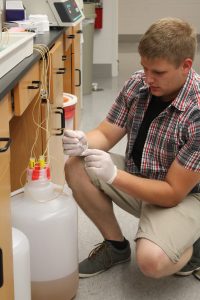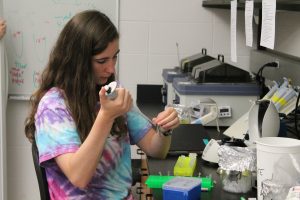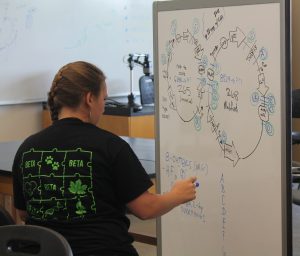The National Science Foundation awarded the largest grant in University history – $1,106,896 – to two Missouri Western professors, Dr. Todd Eckdahl, professor of biology, and Dr. Jeff Poet, professor of mathematics, and two Davidson College (North Carolina) colleagues, Dr. A. Malcolm Campbell, professor of biology, and Dr. Laurie Heyer, professor of mathematics, to continue their synthetic biology research with students for three more years.
The grant amount eclipsed a $1 million-plus grant that the professors received in 2013 for the synthetic  biology research.
biology research.
“This grant application succeeded because we have a track record of producing results,” Dr. Eckdahl said. “Our students are publishing papers in professional journals, presenting at professional conferences and making genuine contributions to an emerging field of science.”
Dr. Eckdahl explained that the field of synthetic biology is only about 15 years old. He describes it as a re-invention of genetic engineering, which came about in the 1970s, with more emphasis this time around on the engineering.
The grant, “Broadening the Application of Programmed Evolution for Metabolic Engineering,” is a collaboration between Missouri Western and Davidson College. It began in September 2016 and funds 36 full-time, 10-week summer research positions for undergraduate researchers – 18 at Missouri Western and 18 at Davidson. The grant also pays for faculty member summer stipends, research supplies and equipment, and research-related travel.
The Missouri Western team will travel to Davidson for a week and the Davidson team will travel to Missouri Western for a week each summer. The grant also funds travel to national conferences where students and faculty will present the results of their research.
Some of their research involves using recently developed technology, Dr. Eckdahl said, and Missouri Western and Davidson are two of just five universities worldwide that are using it (see “The cutting edge research explained.”)
 This is the fourth grant the synthetic biology program has received from NSF. The teams were awarded $342,900 in 2007, $400,000 in 2011, and $1,045,965 in 2013. The professors also received a $269,700 grant in 2011 to conduct three summer workshops to train faculty across the country on how to use synthetic biology in undergraduate teaching and research.
This is the fourth grant the synthetic biology program has received from NSF. The teams were awarded $342,900 in 2007, $400,000 in 2011, and $1,045,965 in 2013. The professors also received a $269,700 grant in 2011 to conduct three summer workshops to train faculty across the country on how to use synthetic biology in undergraduate teaching and research.
Dr. Eckdahl noted that the research grants are very competitive, and when they apply, they are competing with large and small institutions from across the country. Fewer than 10 percent of submitted grant proposals are funded. Additionally, for the last two grants, the NSF funded the full amount of the application, which he said was very unusual.
“We are satisfying NSF that we are advancing science while delivering educational value for our students,” Dr. Eckdahl said.
The undergraduate synthetic biology research at Missouri Western and Davidson began in the summer of 2006 with collaboration among the two biology and two mathematics professors.
Dr. Poet noted that the Missouri Western students who have been involved in the program have gone on to graduate school, medical school or have become high school teachers, and many are currently working in the St. Joseph region.
“None of the four faculty could imagine in 2006 where this would lead us 10 years later,” Dr. Poet said. “The opportunities for our students are unmatched, and the students have always made the most of them.”
“We all feel really grateful to NSF that we are able to get funding to provide these opportunities for our students,” Dr. Eckdahl said. “They are the future of science.”
The cutting edge research explained
We asked Dr. Todd Eckdahl, the principal investigator on the recently awarded $1.1 million National Science Foundation grant, and Dr. Jeff Poet, professor of mathematics, to explain the research that the grant is funding for the next three years, in collaboration with Dr. Laurie Heyer and Dr. A. Malcolm Campbell from Davidson College in North Carolina, and students from both institutions.
 Synthetic biology research, which came about around 15 years ago, uses mathematical modeling and molecular biology methods to design and construct new biological parts, devices and systems. The students, all undergraduate math and biology majors, are working to engineer E. coli bacteria to produce new products, such as pharmaceuticals and biofuels.
Synthetic biology research, which came about around 15 years ago, uses mathematical modeling and molecular biology methods to design and construct new biological parts, devices and systems. The students, all undergraduate math and biology majors, are working to engineer E. coli bacteria to produce new products, such as pharmaceuticals and biofuels.
“How do you tell bacteria how to do that? What is the best way for E. coli to make a drug?” Dr. Eckdahl says. “We decided that bacteria would know best.” So the researchers program the E. coli cells with a number of variations in the genetic elements that encode the new metabolism, and the bacteria figure out which is the best, which is a different process than most researchers have been using. “The E. coli are rewarded for making our protein by living and reproducing,” he said.
The team named their process “Programmed Evolution,” and published a paper about it in 2015. The paper was the subject of a popular “Ask Me Anything” event on Reddit.
A key component of Programmed Evolution is a riboswitch, which is an RNA molecule that controls the expression of genes. In order to develop Programmed Evolution for new applications, the researchers needed new riboswitches. The group uses riboswitches, Dr. Eckdahl explained, to detect a desired product of bacterial metabolism and turn on genes that allow bacteria to survive.
The group learned there were very few riboswitches that functioned well, so the Missouri Western-Davidson team invented a method to discover better riboswitches. Their method, however, didn’t have the capacity to explore the number of sequences of RNA that they needed to explore.
So, early in the summer of 2016, they requested permission from Harvard University to use a method that its researchers had created less than five years ago – PACE (phage-assisted continuous evolution). Phage, or bacteriophage, are viruses that infect bacteria.
“This is right on the cutting edge,” Dr. Eckdahl said of the PACE technology. He noted that only five universities in the world are conducting research with PACE, and Missouri Western and Davidson are two of them. Additionally, the other three universities have graduate students and post-doctoral researchers conducting the research, whereas Missouri Western and Davidson are conducting PACE research with undergraduates.
By the end of the 2016 summer research, students had conducted experiments with PACE, which is very complicated, and developed a way to use PACE for riboswitch discovery. Next summer, they will focus on using it for riboswitch discovery so they will be able to return to Programmed Evolution to make useful products in E. coli bacteria.
So where does the math come in? Dr. Poet said his math students conduct mathematical modeling and statistical analysis to support the biology research.
For example, there are millions of factors to consider in their research, and the mathematicians create simulations that narrow down the range of variables.
“We try to use math to help inform the biology,” he says. “We give them better starting points.”
Nature and biology are very difficult to understand, but the math component makes it more understandable, Dr. Poet said.
So next summer, if you happen to be in Remington Hall and see students diligently working in the labs, it may be the NSF-funded cutting-edge researchers from Missouri Western and Davidson College, making an impact on our future.
